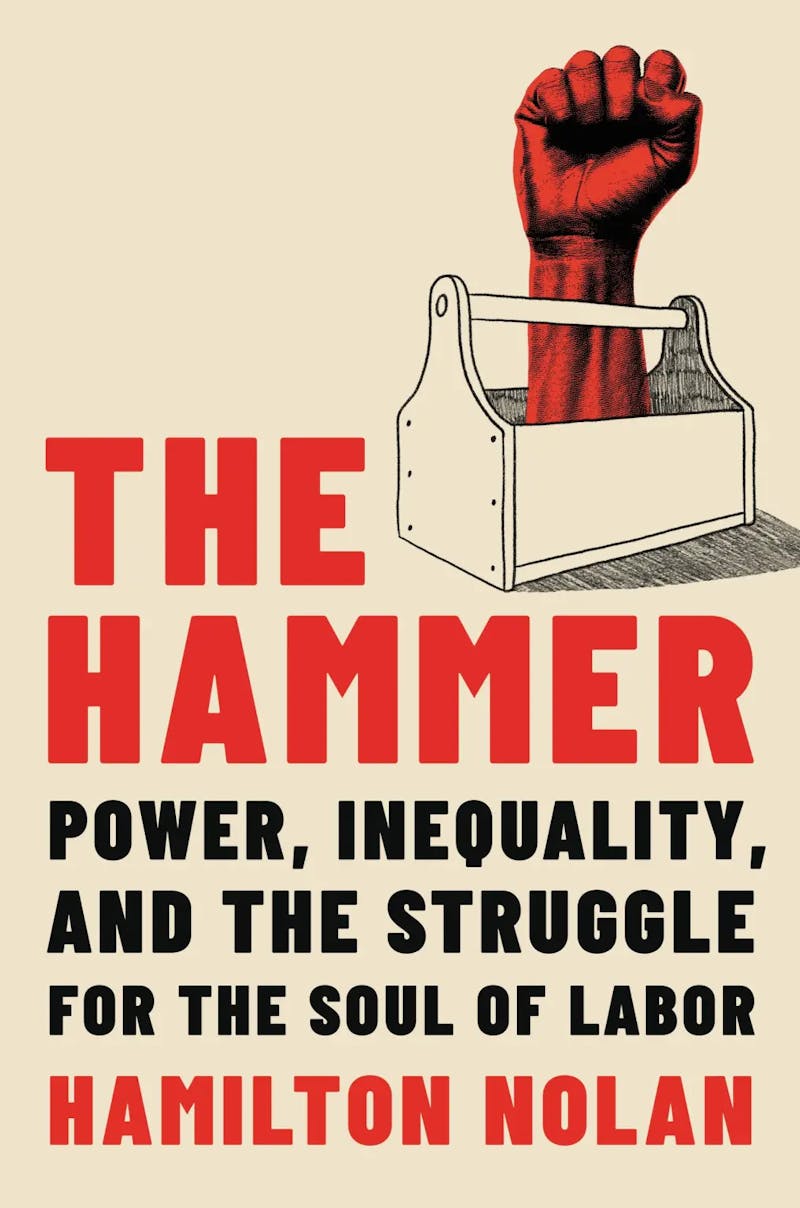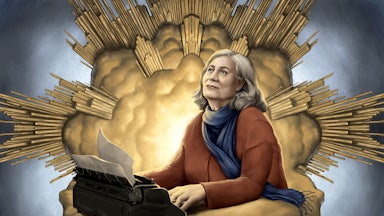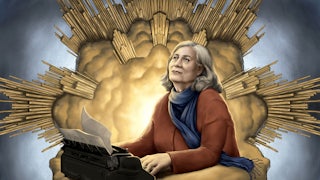In today’s political landscape, labor unions are polling higher than most elected officials—a testament to their enduring relevance and potential for transformative change. Yet unions still find themselves on the defensive after decades of political hostility, unfavorable labor laws, and entrenched corporate power. Despite union popularity at historic highs, union membership has continued to decline in the wake of the pandemic, even as we witnessed a wave of strikes and new organizing campaigns at companies like Amazon and Starbucks. Under the most pro-union president in history, the 10 richest men doubled their wealth, pro-worker legislation like the Protecting the Right to Organize Act has languished, and the National Labor Relations Board has come under attack in the courts.
In his new book, The Hammer: Power, Inequality, and the Struggle for the Soul of Labor, veteran labor journalist Hamilton Nolan makes the case that unions are the most effective tool the working class has to shift political power, fight rising inequality, and pull the electorate to the left. Nolan travels across the country, interviewing workers from a range of industries, and showing how unions embody “democracy in action.”

With an urgent call to action, Nolan advocates for a shift in perspective, urging a renewed focus on building labor power as a means of influencing national politics and countering the rise of the far right. His insights not only illuminate the current state of the labor movement but provide a roadmap for revitalizing unions and reshaping the political landscape in the United States. I recently spoke to Nolan about the importance of growing union membership, organizing the South, and changing electoral politics. Our conversation has been edited for length and clarity.
Indigo Olivier: You’ve observed that being involved in a union fundamentally changes people. How would you describe that transformation?
Hamilton Nolan: I think that the process of going through a union organizing drive teaches people a lot of things. One thing that it teaches people is democracy in action.
If you grow up in America as the average person, you’re never really in a setting where you are living democracy in action. As a child, you’re in a family, you’re told what to do; you go to school, you’re told what to do; you get a job, you’re told what to do. Where is this democracy in action that people are supposed to see? For a lot of people, the first time they really live democracy in action and experience a democratic institution is when they join a union or when they go through the process of organizing a union.
In particular, new organizing—making people go through that process of organizing with their co-workers and, most of the time, being in a fight against the boss—is also something that instills class consciousness in people in a way that you can’t do just by telling people to read a book, because it’s lived experience. People might never have read Marx, but they can see that their boss is lying to them, and trying to keep them poor, and telling them that they don’t deserve to be paid what they’re worth. All that stuff is first-person experience that changes people politically.
When we talk about the value of reviving unions, in a political sense, it’s not just like, oh, union members tend to vote more Democratic, and that’s good. It’s that the experience of organizing a union and being in a union changes people in a way that lines up with progressive values.
I.O.: How would you describe the relationship between labor and electoral politics?
H.N.: The reality of the way that the institutions of organized labor, meaning the AFL-CIO, and the big unions, generally speaking, have mostly, in modern times, pursued a relationship with electoral politics [is] along the lines of, “We are an adjunct to the Democratic Party.” In some ways, it’s a natural sort of trap for unions to fall into, because we have a two-party political system and the Republicans want to destroy unions altogether. So it’s very easy for the Democrats to take labor for granted because they have the attitude of “Where else are you gonna go?” And you’ve seen, just in my lifetime, I think of the Clinton administration, the Obama administration, both administrations that got huge economic and other support from organized labor and didn’t really give that much back.
What it means is that you change your focus from electoral politics to building labor power through worker organizing. And by organizing workers, you naturally grow your own political power in a way that writing checks to politicians never does.
I.O.: You mention that higher union density pulls politics to the left of center and is the most effective way to counter the rise of the far right. What lessons can Democrats learn from the labor movement?
H.N.: The entire Democratic Party would be much healthier, a much better place, if labor was running it. Labor is too weak to do that right now. But we know, for example, even academic studies show that being in unions makes white workers less racist, essentially. It promotes equality, it promotes economic equality, it promotes gender equality, it helps to stop discrimination—all of the values that the Democratic Party likes to espouse. Organized labor is actually something that brings those things about, and so I think that the Democrats should place much more of a value on organized labor and they should spend more of their political capital helping organized labor to get stronger again. Not only because increasing union density is going to bring about the values that you’re supposed to support. But also because you are actually changing the population. You are changing voters in a way that ultimately will benefit the Democratic Party by making people more progressive and also less likely to sort of give up hope, which is something that fuels fascism.
I.O.: You’ve made the case that unions can replace the role elections currently play in national politics. How would this alter the political landscape?
H.N.: Look, elections are obviously important. And we all know that what Washington does is important. I think what we need is a shift in perspective as working people. And one thing that I hope people will take from the book is just the shift in perspective away from politics being elections and politicians, toward the idea that politics can be accomplished by building labor power. If we can get working people and also unions and the institutions in the labor movement to turn their primary focus to building labor power and organizing new workers, what we will find is that political power naturally comes along with that. We can make the politicians come to us by making the labor movement strong. We don’t have to beg and cater to politicians in order to do nice things for the labor movement, you know. It’s really a shift in perspective and a shift in emphasis that I think if people would just focus more on building labor power, they’re going to get better political results in the long run.
I.O.: What are some of the biggest challenges the labor movement will have to confront to get there?
H.N.: When you talk to union leaders about the decline of unions, and why we’ve had this more than 50-year-long decline of union density in America, they will usually talk about the bad labor laws we have, the hostile political situation, corporate power, Republican union busting. And all that stuff is true.
But we as a labor movement have to be able to operate in a hostile environment, because the Taft-Hartley Act, which made all the labor laws bad in the first place, was passed in 1947. So your strategy can’t be, we’re going to organize as soon as we change this law that we have not been able to change in more than 70 years.
We are in a period right now with some of the most favorable conditions on the ground that we’ve seen in generations for union organizing. And yet, union density went down in 2022. And it went down again in 2023. What that shows you is that the biggest institutions in organized labor are not reckoning with the fact that we must turn around this decline and that this is as good a time to do it as we’ve had in my lifetime, and that means organizing millions of people.
I.O.: You’ve written about the importance of organizing the South. Why is that effort so essential to building labor power nationally?
H.N.: The call to organize the South has been going on for over a century now because the South has always been a place that treated workers worse and paid workers less than the rest of the country. The labor movement has always known that part of our ability to exercise strength in this country depends upon the ability to organize the South, because if you don’t organize the South, what happens is every company that wants to break the power of organized labor just moves its operations to the South, and that’s something that’s been going on for a long time. And it’s still going on. That’s why there are so many auto factories and tire factories in the South because those companies essentially use the South in the same way that they use offshoring, which is to move out of stronger union states and into more hostile states to unions.
So it’s an existential challenge for organized labor to organize the South because if you don’t organize the South, you always have this region that companies can just use to jump into and wash their unions off them. Having an unorganized South, and a South that has really low union density, as it is now, is obviously bad for working people in the South. First of all, it keeps them poor and it keeps them mistreated by their companies. But it’s also bad for the power of unions nationally because it allows companies to have a place to flee to.
I.O.: How do you see the labor movement being affected by a second Trump administration?
H.N.: Badly. In a second Trump administration, you can expect every single good thing that the NLRB did during the Biden administration to be aggressively rolled back. I think you can expect to see him really attack the civil service. So public-sector unions are going to find some of their most basic protections being yanked away from them in a way that they probably have not ever experienced before. That’s the strongest union sector in America. So on a practical level, on a regulatory level, it would be horrible. The government will essentially be weaponized against unions. And obviously, he’s going to pursue economic policies that benefit the rich and not the working class. So you know, the entire operation of the government would be anti-union. So there’s no question that stopping Trump from assuming office is a very important thing for the labor movement. On the other hand, if it does happen, you know, the labor movement has been through worse things in the past and they’ll come out the other side still alive.






